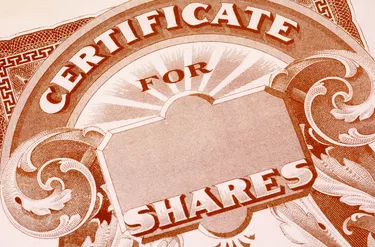
A stock certificate represents physical proof of your ownership stake in a particular company, but your right to your shares doesn't go away when you lose your stock certificate. Regardless of how you lost your certificate, you will eventually be reunited with your stocks. In some instances it's an easily resolved issue, while in other situations replacing a stock certificate requires a good deal of patience.
Paperless Transactions
Video of the Day
Up until the last few decades of the 20th century, practically everything in the financial world revolved around paper. Bank balances were tracked on ledgers, and you physically took possession of securities such as bonds and stock certificates. Paper no longer plays a major role in the financial sector. In fact, many securities transactions no longer involve paper stock certificates at all. Some brokers provide paper copies to clients who prefer to have a physical record of a sales transaction, but paper certificates are often superfluous in the bigger scheme of things. Before you tear your home apart looking for the missing certificate, you should contact your broker to see whether an electronic record exists.
Video of the Day
Brokerage Accounts
Some, though not all, securities transactions still involve traditional paper certificates. Despite this, you may never actually set eyes on one. To provide convenience for customers and to expedite trades, many brokers hold onto paper certificates. The certificates belong to you but are physically held at your brokerage firm. When you buy and sell shares, your broker may provide you with a transaction statement detailing the stocks you purchased. This form should not be confused with the actual stock certificate. Check with your broker to ensure the form you lost was actually the certificate in question and not a sales receipt.
Lost Property
Lost stock certificates often end up being surrendered to the state under escheatment laws. These laws are based on centuries-old statutes from Europe that required people to surrender unclaimed property to the crown. Laws vary from state to state, but if you leave a bank or brokerage account inactive for a year or two, the financial firm may hand over your cash and securities to the state. Likewise, stocks held in a safe deposit box end up being turned over to the state if you fail to pay your box rental fee. Mix-ups involving mergers at brokerage firms can also result in stock certificates and other property wrongly being surrendered to the state. Fortunately, you can get your possessions back by contacting your state's department of unclaimed property.
Replacement
When all else fails, you can replace a lost stock certificate by completing a loss affidavit through your broker. You must list any pertinent information relating to the certificate such as the location where you last had it and the purchase date. You also take out a surety bond. The bond protects the stock issuer in the event that you or someone else manages to locate and cash in the original stock certificate. You cover the cost of the bond, while the stock issuer enjoys the benefits. Bonds typically cost between 2 and 3 percent of the stock's face value. The issuer will provide a replacement certificate once you've signed the affidavit and acquired the bond.